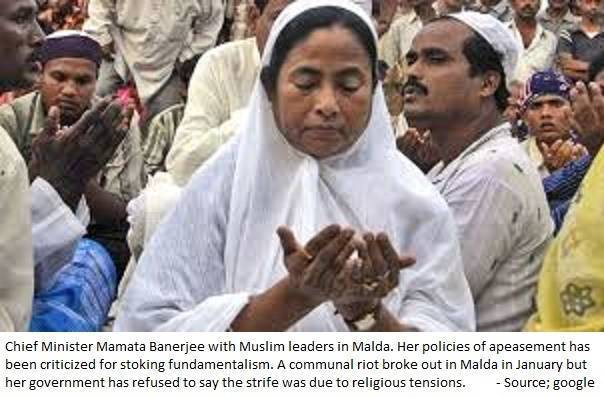Killing in Bangladesh Casts Shadow on WB Polls
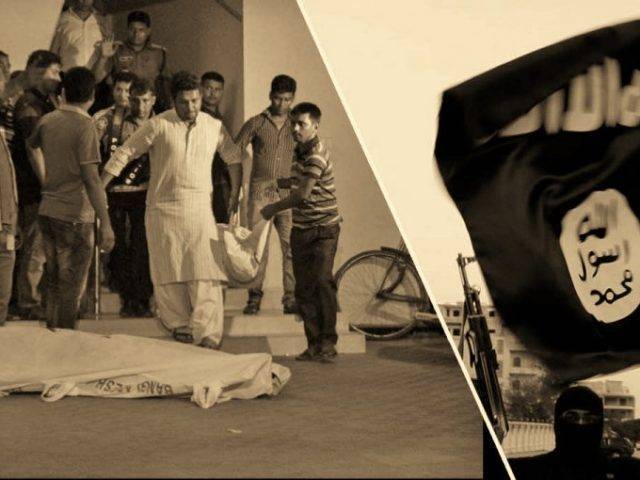
“Progressives are to be attacked and even physically harmed. The progressives have to be finished just the way they are being finished in Bangladesh. This is the Bangladeshi Jamaat effect.”
– Kazi Masum Akhtar, former Headmaster, Talpukur Aara High Madrasa, Calcutta
Staff
CALCUTTA – Despite accusations of ‘terrorism’ identified as being perpetrated by election officials and police from Chief Minister, Mamata Banerjee (by that, she apparently meant the Election Commission entertaining complaints against her party and police actually doing their jobs for a change) Phase 5 of the West Bengal Election occurred peacefully. This was in stark contrast to bloody Day 3. But on polling day, newswires were abuzz with reports of horrific violence across the International Border (IB): In Bangladesh, a Hindu tailor named Nikhil Joarder was hacked to death by machete wielding assailants for alleged speech that blasphemed Islam. Isis has since claimed responsibility.
The killing is the latest in a wave of violence against minorities and religious dissenters in Bangladesh. Six atheist bloggers, intellectuals and publishers have been killed in the past 14 months and, last week, three LGBT rights activists were hacked to death in a brutal home invasion. Human rights groups have documented over a thousand cases of violence and intimidation against religious minorities and secular intellectuals in this Muslim majority secular democracy over the same period. The latest murder comes as a surprise because the victim had already been imprisoned for three weeks for blasphemy and those who’d lodged the complaint against him recanted, leading to his release.
Coming as voters went to the polls in West Bengal, the incident highlighted the nexus between the ruling party in the state and Islamists, for the Saradha Ponzi Scheme, which had implicated high ranking members of the Trinamool Congress Party (TMC) in 2014 had allegedly caused money to be laundered through Islamic terrorist organizations . These same groups have been banned in the US and other countries and are responsible for spreading Islamic extremism in Bangladesh – of the very sort responsible for the recent killing there.
For long, Narendra Modi’s BJP was trying to make TMC links to terrorists an election issue but, surprisingly, the issue has not gained traction with voters in the state. Modi’s Hindu-dominated party has never been popular in liberal West Bengal, especially Calcutta. With the decimation of the Left Front in 2011 and dynastic politics dominating the Congress Party, residents of the state see little option but more of the same. But many are simply too scared to vote their conscience. Whether or not the TMC has done deals with terrorists, a culture of fear propagated by the demagogic chief minister continues to permeate the state.
TMC LEADING A FIFTH COLUMN?
Exiled Bangladeshi writer, Taslima Nasrin, whose infamous book, Lajja, documented cases of extremism in Bangladesh and climbed the best-seller lists outside of South Asia twenty-two years ago just as she faced a ban, death threats and expulsion from her country, has gone on record alleging money was routed through Trinamool Congress Rajya Sabha MP Ahmad Hassan Imran to Bangladesh-based terror outfit Jamaat-e-Islami. “Imran is a founder member of terrorist organisation SIMI (Student Islamic Movement of India). That was enough for not letting him be a member of a political party. But he was made a Rajya Sabha MP (member of the upper house of parliament) by Mamata Banerjee. He helped terrorism to grow in Bangladesh using Saradha’s crores of rupees,” she said, adding: “Bangladesh’s Islamic terrorist organisation is known to be anti-India. This is all happening on Mamata’s watch.”
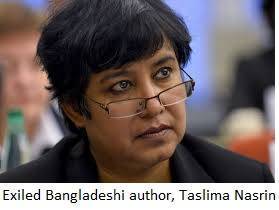 Highly-placed sources in Indian intelligence have made similar allegations. In a report in 2014 submitted to the Home Ministry on the Burdwan blast in 2014, it was stated that suspicions about some politicians in West Bengal having links to the terror network needed to be investigated.
Highly-placed sources in Indian intelligence have made similar allegations. In a report in 2014 submitted to the Home Ministry on the Burdwan blast in 2014, it was stated that suspicions about some politicians in West Bengal having links to the terror network needed to be investigated.
At the time, Ananda Bazar Patrika, West Bengal’s most highly circulated Bengali language newspaper published this account in a report: “Before 2011, the Jamaat helped Trinamool with huge funds secretly transferred across the border. Imran played a key role in it. Later when the Jamaat faced government’s ire during its opposition to war crimes trials, it received funds from Trinamool which had come to power in 2011 and many of whose leaders were ministers in the Manmohan Singh government,” the ABP reported. The implication is clear: that support for clemency for the alleged war criminals from TMC members of the United Progressive Alliance (UPA) government at the center, headed by Prime Minister Manmohan Singh, had been bought by the Jamaat. The story had quoted extensively from a detailed white paper, the newpaper claims was given to India by Bangladesh intelligence.
A state Congress leader, who requested anonymity alleged that the TMC’s international policies relating to Bangladesh were influenced by Jamaat money: “Mamata herself should be charged with anti-national activities as she blocked the India-Bangladesh treaty on Teesta waters in 2011 — a deal which would have strengthened Sheikh Hasina politically. The failure of that deal weakened her and strengthened the Jamaat and other anti-India forces.”
Imran, an upper house MP appointed in 2014 on recommendation of TMC leader, (she’d been a key member of Manmoha Singh’s fractious ruling alliance) founded West Bengal Muslim Students Association in the mid-’70s. He went on to co-found the Students Islamic Movement of India (SIMI) at Aligarh Muslim University in Uttar Pradesh in 1977. According to both the Government of India and the independent, Terrorism Research and Analysis Consortium (TRAC), SIMI “advocates the ‘liberation of India’ by converting it to an Islamic state. The organisation has declared Jihad against India, the aim of which is to establish Dar-ul-Islam (land of Islam) by either forcefully converting everyone to Islam or by violence.” So, it is easy to see how SIMI members could be attracted by groups such as ISIS, their sharing a fundamentally identical aim. SIMI leaders have been known for over a decade to have linkages to the Pakistani-based Lashkar-e-Taiba who along with the Pakistani Intelligence organization, ISI, were responsible for the 26/11 attacks in Mumbai in 2008 and which have been replicated in Europe by ISIS. SIMI was banned for its support of terrorism and insurrection in India in 2001 when Banerjee was Union Railway Minister in Manmohan Singh’s government. Hence, she must have been aware of Imran’s dangerous past.
Also astonishing is the revelation that Imran may technically be a Pakistani Citizen. The Indian Express quoted a Special Branch report of Assam Police in 2014 on this: “Hassan (Ahmed Hassan Imran) infiltrated Assam long before the birth of Bangladesh and as such, is an East Pakistani. His father too infiltrated, but took up a job in a tea garden in West Bengal, where he was killed by freedom fighters from Bangladesh who came across the border. His visits to Assam from West Bengal were monitored and he was found to be closely linked with several organisations close to the Pakistan’s ISI.”
The report continued, implying that he was an ISI asset: “He (Hassan) had visited the camps that were being run at Moulavi Bazar in Sylhet, in the 80s, by an ISI Major. He maintained a façade while in Assam, saying he was a Leftist, since he was settled in CPM-ruled West Bengal. But, his agenda in Assam was clear cut and to some extent, he did succeed in consolidating anti-India forces here.”
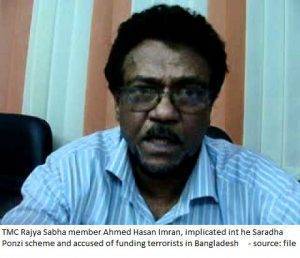 The revelations in 2014 caused the Bangladesh government to establish a probe into connections between the Jamaat-e-Islami, the JMB and the Trinamool Congress Party; their foreign minister, Abdul Hassan Mahmoud Ali raised the issue in New Delhi and urged the Central Government in India to take action against those in the TMC who had financial connections to the banned Jamaat-e-Islami and who have given safe harbor to JMB terrorists in West Bengal.
The revelations in 2014 caused the Bangladesh government to establish a probe into connections between the Jamaat-e-Islami, the JMB and the Trinamool Congress Party; their foreign minister, Abdul Hassan Mahmoud Ali raised the issue in New Delhi and urged the Central Government in India to take action against those in the TMC who had financial connections to the banned Jamaat-e-Islami and who have given safe harbor to JMB terrorists in West Bengal.
The financial links have since been established. During its probe into the Saradha scam, the Enforcement Directorate discovered that money was sent to the Islami Bank Bangladesh to be invested in real estate but that this was merely a cover for laundering money. Moreover, the organization of which Imran was a founder, was investigated as recently as March, 2016 for its links to ISIS.
Imran has long ben associated with money coming from extremist sources, beginning with his appointment as a chief official of the Jeddah-sponsored Islamic Development Bank (IDB). The Managing director of this bank, Mamul-Al-Azam is the son of Golam Azam, former chief and founder of Bangladesh’s radical Islamic organization Jamaat-E-Islami. The bank has long been criticized for funding terrorism in the name of development; it was most recently linked to funding the radicalization and support of the 2013 Boston Marathon Bombers. Intelligence agencies have reports of SIMI’s link with the IDB as well.
Despite having having only a high school education, he covered India for a Bengali language daily newspaper published in Bangladesh called Naya Diganta, which was known as the propaganda arm of he Jamaate-e-Islami. While this may seem unusual, conventional education is of little value to Islamists – only their Islamic credentials matter – and on that score, Imran had stellar credentials. He was also a news gatherer in West Bengal for Radio Tehran. In 1981, he started small a Bengali language magazine called Kalom with address at 19, Dargah Road but later in 1998 the office was moved to the premises at 45, Elliot Road. The Dargah Road office was subsequently given over to SIMI, and was used as a safe-house for their clandestine activities. In its new offices, the magazine acted as mouthpiece for SIMI’s extreme and violent Islamist views and helped garner support for the organization over two decades.
When the CPM dominated West Bengal politics, Imran was an avowed Marxist. However, he and his magazine Kalom became fervently pro-TMC after former CM Jyoti Basu’s death and the controversies at Singur and Nandirgram caused the party to fall out of favour with the electorate. By this time, having a state-wide readership, the magazine’s support was a key factor in mobilizing the Muslim vote in favour of the TMC. In the same year, the magazine became a weekly and was sold to the Saradha Group but Imran remained editor. In 2012, the magazine was revamped as a daily to accelerate extreme Islamist dominance of West Bengal’s Muslims, its maiden issue being inaugurated by none other than CM, Mamata Banerjee at Calcutta Town Hall. And so, she became the sole Chief Minister in WB history to publicly endorse an Islamist cause.
Before being appointed to the Rajya Sabha, Imran was implicated in the Kolkata riots to protest entry of Taslima Nasreen into the state in 2007. It had turned city streets into a battleground that was only quelled when the CPM State Government requested the Indian Army to intervene. He was also allegedly involved in instigating the communal Canning riots in which the homes of over 200 Hindus were burned and 2,000 people displaced after a Muslim cleric was killed without premeditation during a random robbery in the mainly Hindu Canning area.
FOLLOW THE MONEY
Estimates have the Saradha Group collecting around 40 Billion Rupees (then around 900 million dollars) mostly from villagers and farmers of modest means across West Bengal. Much of the Indian-sourced money went offshore. According to Imran’s colleague and MP, Kunal Ghosh, now jailed due to the scam, this money was packed into bags and smuggled across the Bangladesh border where it was converted in to Bangladeshi Taka and Euros. Local currency went to fund extremist organizations such as Jamaat while the international currency became West-Asia-bound. It is not known if some of the foreign currency got into the hands of Arab Islamists but Ghosh, after being interrogated in 2014 told police that the West Asia hub was critical to laundering the money, so it could go back into the hands of people in West Bengal, including TMC members.
This is corroborated by the New Indian Express:
The CBI and ED learnt that funds collected from the public through Saradha’s chit fund schemes were centrally deposited at the group’s offices in Salt Lake. After being accounted for, hundreds of crores were transported to various centres close to the Indo-Bangladesh border…..
….Armed couriers of radical Islamic outfits would then smuggle the converted currency across the border under the cover of darkness…..The deal was that Sen would finance these radical outfits, mainly the Jamaat-e-Islami Bangladesh….. The leaders of these outfits had to arrange for Sen’s funds to be sent to banks in Europe through their couriers …..
……Former Special Director, Intelligence Bureau, Dhanesh Chandra Nath said, “We all know who this man is. It is unfortunate that West Bengal CM Mamata Banerjee sent Ahmed Hassan alias Imran to the Rajya Sabha despite knowing his antecedents. When SIMI was banned in 2001, Mamata Banerjee was a Union minister and she should have known about its leader’s activities in West Bengal. What is of serious concern to us is the planned infiltration of the known subversive elements into the most sacred and highest corridors of power”……..An ED officer said, “We have concrete evidence against him. He was in charge of a Bengali daily financed by Saradha and was involved in financial transactions…..”
While Ghosh could not give any figures, intelligence agencies believe that Rs 600 million (around USD 10 million) was transferred to Islami Bank through some politicians who were allegedly involved in the Ponzi scheme. The role of some TMC leaders other than Imran, is still being investigated.
Another TMC MP, Srinjoy Bose was arrested in 2014; he alleged four other TMC MPs were involved and he hinted that the trail would lead right to the top, implicating the Chief Minister as well. Many said he was merely trying to save himself but the interest shown by the TMC in monitoring or obstructing the investigation raises troubling questions.
Close aid to the CM, MLA and former State Sports and Transport Minister Madan MItra was also arrested in December 2014 and recently contested his Kamarhati constituency from jail (he is predicted to win, despite being incarcerated while awaiting trial on various charges including Cheating, Criminal Breach of Trust and Money Circulation or laundering).
It is the money laundering that is being linked to terrorism: “The Islami Bank is known to have close links with the radical group Bangladesh Jamaat-e-Islami. The money from the scam routed to the group could have been used to fund JMB, which is planning terror strikes in India and Bangladesh,” said a government official. Banned by Bangladesh in 2005, the JMB is allegedly responsible for the Burdwan explosion in West Bengal in 2014. More than 50 Improvised Explosive Devices (IEDs) were recovered from those arrested in connection with the blast.
DIDI’S COWBOYS
Members of the TMC, it is also alleged, are deeply involved in the illegal cattle smuggling trade across the IB to Bangladesh along with corrupt Border Security Force (BSF) personnel – an activity which is also a cover for gun-running and narco-terrorrism.
In the wake of the murder of CPM polling agent, Tahidul Mondal (Islam) during the phase 3 of the WB election, TGC reported State Congress Party Leader Adhir Chowdhury telling media that, “the BSF is involved with the cattle smuggling racket and have struck some sort of understanding with the TMC…We have requested the EC to deploy CRPF (Central Reserve Police Force) jawans here (Murshidabad) instead of BSF.” He alleged that the BSF had facilitated the escape of the murderers (allegedly supporters of the TMC) due to their relationship with TMC supporters involved in cattle smuggling. This claim has been denied by the TMC.
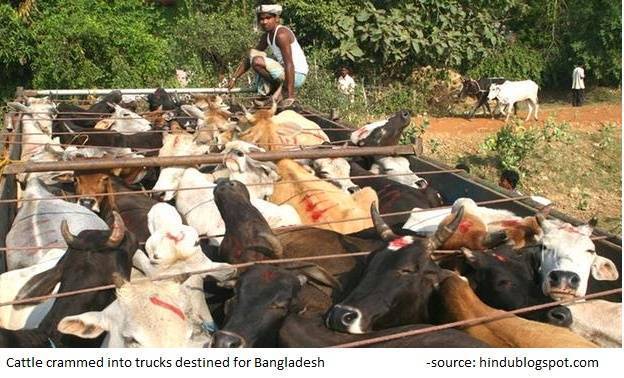 Cattle smuggling occurs because it is a lot cheaper for Bangladesh to source their cattle from India, which has surplus of the animal, though export is illegal. Bangladesh has essentially legalized smuggling by permitting a smuggler to pay 500 Taka (the equivalent of less than $US 7) to bring in illegal cattle. Thus, a clandestine cattle smuggler on the Indian side of the IB becomes a legitimate cattle trader on the Bangladesh side.
Cattle smuggling occurs because it is a lot cheaper for Bangladesh to source their cattle from India, which has surplus of the animal, though export is illegal. Bangladesh has essentially legalized smuggling by permitting a smuggler to pay 500 Taka (the equivalent of less than $US 7) to bring in illegal cattle. Thus, a clandestine cattle smuggler on the Indian side of the IB becomes a legitimate cattle trader on the Bangladesh side.
As Bangladesh is a friendly nation the Central government has given instructions to use minimum force with offenders, giving them pellet and air guns instead of proper firearms to deal with the situation. One BSF officer expressed his frustration over the policy to TGC, “What can we do, four or five guys on a border crossing with basically toy guns against heavily armed gangsters moving hundreds of cattle in the black of night? And with the cattle, comes arms, drugs, black money and fake currency. So, one can understand why some BSF officers have just given up. They’ve taken the position that when the government doesn’t back us properly, why not make some money from it? This is a Central government that supposedly holds the cow sacred. What a bunch of hypocrites!’
THE CURIOUS CASE OF ABDUL BARIQUE BISWAS
While the truck drivers tend to be Hindus and Sikhs, the cattle-traders are invariably Muslim. Vote-bank politics initially put the TMC in the corner of the cattle-trader but in the wake of Saradha and accusations of money smuggling, the relationship has taken on a more sinister character. Abdul Barique Biswas and other elements perceived to be close to the TMC have often been associated with trans-border gold smuggling as well as cattle smuggling interests.
One doesn’t have to look far to find danger: Across a narrow silvery river known as the Ichamati, which separates India and Bangladesh by only 40m, lies Satkhira — a stronghold of the militant Islamist Bangladesh Jamaat-e-Islami, who are increasingly being held responsible for war crimes in that nation. They take refuge across the IB in North 24 Parganas of West Bengal when things get too hot for them in Bangladesh. In the wake of Joarder’s killing, if it can be proven that TMC supporters are helping harbor these accused war criminals and their terrorist brethren, the fate of the TMC would surely be precarious in the state.
Biswas started out as a small-time cow smuggler when the CPI (M) was in power. He was close to the Marxists, then – but also had good relations with a Congress leader. By 2011, he had shrewdly aligned himself to the TMC, and his haul had grown to other things. His proximity to power intimidated police into giving him a free pass.
With his preference to be paid in gold rather than either country’s currency, the Directorate of Revenue Intelligence (Central Govt.) caught him with 130 million Rupees worth of gold on him causing him to whip out a pistol. He was no match for the intelligence officers, though who overpowered him and make an arrest.
Though incarcerated, he still manages to run his criminal organization. He has even taken to buying up property in Calcutta with his ill-gotten gains – one of the many criminals who inflated the Calcutta real estate bubble in recent years. And, though he is barely literate, he owns multiple registered companies. The Regional office of the Central Government Intelligence Bureau (IB) have identified him as a terrorist facilitator: “He is one of the men responsible for Jamaat terrorists coming in from Bangladesh. Even from jail, he has sub-contracted operations at various points from Swarupnagar to the Sunderbans. All local politicians, police officers and even border officers are in his pocket. It is through these routes that the accused inthe Burdwan blasts entered West Bengal. It was a well chalked-out plan. In fact, one of the main accused, Sajid, and his wife too were helped by Biswas.”
HARBORING TERRORISTS FROM BANGLADESH
The explosion occurring at 12 noon on 2nd October, 2014 in a two-storeyed building in the Khagragarh locality of Burdwan., which has subsequently been called The Burdwan Blast was actually an accidental detonation of home-made explosives or Improvised Explosive Devices (IEDs) of which more than 50 undetonated bombs were later found. SIM Cards, tools for making explosives and Taliban training videos were also confiscated from the site. The building was owned by Nurul Hassan Chowdhury, a TMC leader who had let the ground floor be used as a TMC party office. In fact, during the Panchayat elections of 2008, the office was used as a TMC Election Office.
Chowdhury rented the 1st floor to one Shakil Ahmed for the paltry sum of Rs. 4,700 (roughly US$70) per month. Ahmed died in the explosion as was his partner Sheikh Sovan; another associate, Abdul Hakim was seriously injured. Through a cell phone call, Hakim led police inadvertently to a second Burdwan terror cell in a house operated by the JMB where 39 more IEDs were found.
After the Burdwan Blast, the Police or Fire Fighters did not enter the first floor flat for at least two hours. The reason: the surviving two wives would not open the door and threatened to open fire. Many don’t buy this explanation, leading the National Investigation Agency (NIA) to launch a probe into the TMC links to the bomb makers and the apparent reluctance of police to investigate on a timely basis. The delay led to the destruction of key evidence by the women. Rather than expressing outrage about this, the CM reserved her rage for the Central Government, opposing the NIA probe tooth and nail.
After destroying evidence and despite being surrounded, Ahmed’s wife, Fatema, somehow (like a character out of a spy movie, in fact) managed to flee to Bangladesh. She was arrested around a month later in there for, among other things, training young women in madrasas (Islamic schools) in arms and manufacturing of explosives. Intelligence sources say that she was provided shelter at Beliaghata in eastern Kolkata by the local TMC legislator at the request of a low profile state minister who is an Urdu-speaking Muslim. Intelligence agencies don’t have enough to make arrests yet but they are keeping a close watch on the northern outskirts of the city which is known for criminal activity.
After the 2011 polls in West Bengal and the general elections in Bangladesh in January, 2014, the conditions in the neighbouring areas of Basirhat in West Bengal and Saatkhira in Bangladesh changed critically. The government of Sheikh Hasina hunting down war criminals, cracked down on the JMB and Jamaat-e-Islami in Saatkhira causing the extremists to flee across a narrow riverine border. They were allegedly welcomed by members of the TMC who had taken money from the JUMB prior to the 2011 election.
During the Bandladesh General election, Jamaat-e-Islami Bangladesh and its terror outfits had killed not only Hindus but also Awami League workers and torched their homes. They were also given arms as well as help of criminals from West Bengal.
With the TMC allegedly harboring these elements and being involved the cattle smuggling racket, an unprecedented electoral backlash occurred in Basirhat (South). For the first time in the state’s history the mainly Hindu Bharatiya Janata Partry (BJP) elected a member to the state assembly, namely Samik Bhattacharya. Bhattacharyya is running for re-election, and is expected to win.
The relatively new MLA claims to have made progress on abating cattle smuggling, telling the New Sunday Express Magazine, “I have taken up the issues with Union Home Minister Rajnath Singh as well as Minister of State, Home, Kiren Rijiju. I have also spoken to local BSF officials. I can claim that within two months I have stopped open trafficking of cows by trucks through the main roads at least in my constituency. But this is an age-old problem which has been going on for decades and I think it’s not possible for the BJP government at the Centre to stop it overnight.”
Intelligence officials say that infiltrators continue to find safe harbor among those in the ruling party in West Bengal. Amitava Mazumdar, a chartered accountant who filed a PIL in the Supreme Court on chit funds has alleged that, “After the Saatkhira crackdown, a number of top Jamaat leaders on their own crossed over and stayed for several months after renting a house at Basirhat. They’ve surrendered to the West Bengal police. After being charged under the Foreigners’ Act, they live in safety in Kolkata’s jails…I have heard about a Rs, 85-crore deal to send Jamaat members to the Rajya Sabha from West Bengal by a particular political party. Persons like TMC Rajya Sabha MP Ahmed Hassan, a founder member of banned SIMI, is very much linked in the Saradha scam and allegedly sending funds to the Jamaat in Bangladesh. That proves the point.”
Bhattacharya tends to agree, saying the constituency has become a “breeding ground for terrorists from Bangladesh. …Because of the porous border, which has rivers, it is not possible for the BSF to stop infiltration by terrorists who are being harboured by the ruling TMC. Of 11 explosions by terrorists in India over the last several years, at least five were connected to Basirhat in some way or other.”
Known Jamaat leaders wanted in Bangladesh for crimes are evading capture, seemingly having disappeared from the country. In reality, they merely cross the narrow sliver of a river that separates their base in Saatkhira to Basirhat. “It is the safest place for them, now… they can keep in touch with their people across the border very easily having obtained ID cards and SIM cards for mobile telephones with the help of TMC leaders,” Bhattacharya told the Indian Express.
A Muslim CPI(M) leader who did not want to be named alleges, “Infiltration has been going on for ages here. But during the last few years after the TMC came to power, Islamic radicals are not only ruling the roost but have unleashed a reign of terror. Huge mosques with funding from the Gulf countries and South Africa are being built in places like Haroa, Kalikapur, Hasnabad, Makalgachhia. For the first time an air-conditioned madrasa is being built at Buripukur.”
While the Centre has identified madrasas as the key means of indoctrination of impressionable use to the path of terrorism, the TMC has welcomed their proliferation, and promised to modernize and build more in their 2016 manifesto. The TMC included Urdu as one of the state languages and announced that 97% of Muslims would be covered in “Other Backward Classes” (OBC) quotas in government and educational institutions regardless of their economic status.
Since being elected in 2011, Mamata Banerjee has enacted a policy of Islamic benefaction, including giving imams a monthly stipend of Rs 2,000, promising to ‘regularize’ 10,000 madrasas. Donning the hijab and performing the namaaz at Muslim functions, the Hindu-born CM’s star seems hitched to the wagon of the Muslim clerics. She has made Jamiat Ulama-E-Hind’s leader, Siddiqullah Chowdhury, who publicly supported the extremist Jamaat-e-Islami of Bangladesh, her party’s candidate in Mangalkot in Burdwan district. In 2013, her government, with Imran leading the charge, ensured that a TV series based on a script written by exiled Bangladeshi writer Taslima Nasreen was shelved. She remains in Delhi, unable to reside in West Bengal due to Islamist opposition, where the majority of people speak the primary language of her art.
“People in West Bengal never voted on religious lines,” says Bhattacharya. “It was Mamata Banerjee who introduced divisive politics by aggressively wooing Muslims.”
Banerjee’s radical policy agenda has even drawn criticism from Muslims. The progressive clean-shaven, former madrasa Headmaster, Kazi Masum Akhtar, who was savagely beaten and banned from the Islamic School he headed for teaching children the national anthem for Republic Day in 2016 says that Banerjee doesn’t want Muslims to think for themselves. He says by keeping the community backward, they will be dependent upon the Mullahs to whom she has a policy of awarding tributes. “the apparent backwardness is being used by some religious leaders, who have nothing to do with religion. And vested interests in government have ensured that some of these clerics are in charge of the Muslim community.”
Allowing the clerics to form government policy towards the Muslim community over the past five years, Akhtar believes, has had dire consequences on the state: fundamentalism , he says, is reaching a zenith in West Bengal, and the rise is eliminating all other voices in the community. “Progressives are to be attacked and even physically harmed. The progressives have to be finished just the way they are being finished in Bangladesh. This is the Bangladeshi Jamaat effect.”
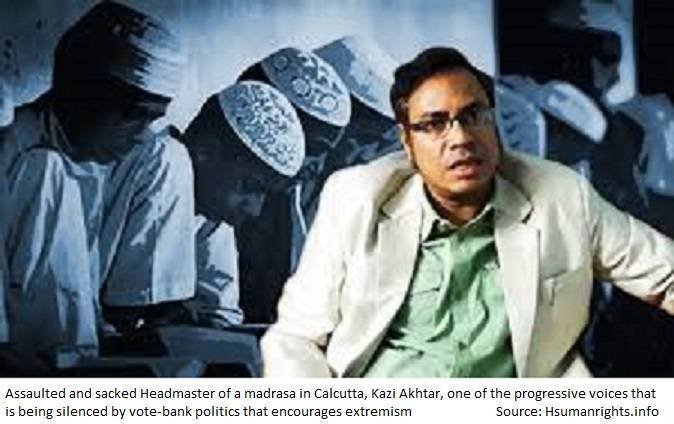
He laments that dialogue has been driven out of the community because of fear, and says that the TMC desires this hegemony because, for now, the Mullahs are supporting them. “Clerics dominate (all discourse)…They are painted as Muslim leaders, while progressive Muslims are ignored.” he says. Before being sacked and beaten by a gang of extremists, Akhtar had previously been criticized for advocating for female education and arguing against child marriage. He has not gone to the madrasa for a year now and is under police protection.
Nasreen agrees. “Mamata doesn’t care for the rights of Muslim women or for the overall betterment of the Muslim community,” she told a local news channel earlier this year. “The Muslim fundamentalists are against women’s rights. They are misogynist, anti-women and oppose secular laws. They do not want justice and equality. They want Muslims to be educated in Madrassas and are completely against secular education. So, by only focusing on vote bank politics and supporting Muslim fanatics, Mamata is only deepening the crisis that Muslims in Bengal find themselves in.”
Not all Muslims are falling in the chasm. Sadia Kkan, 22, a female law student, voting in her first election in Basirhat, came out of a polling booth with an inked finger last week. She openly announced her electoral decision, which was to re-elect Samik Bhattacharya of the BJP. “Mamata Banerjee’s fake policies will ultimately backfire. She offered each Muslim a paltry sum and also decided to pay clerics. The Supreme Court rightly ruled this to be illegal. She just wants to nurture a culture of dependence in the community – a dependence on her. This is the age of the internet and globalization. It is unfair to deny young Muslim’s the right to choose how to live their lives – with whom they should associate – and perhaps most strikingly, where we women should show our faces. There are people (in the community) in high places on the take from the TMC and they are trying to control everything but, ultimately, the community as a whole will wise-up. We are part of the largest generation of young people on the planet. They can’t keep us down for long.”
 The Global Calcuttan Magazine
The Global Calcuttan Magazine 